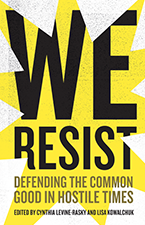
Cynthia Levine-Rasky & Lisa Kowalchuk.
McGill-Queen’s University Press, 2020; 328 pp;
ISBN: 978-0-2280-0142-3.
By Howard A. Doughty
We Resist must not be mistaken for a formal academic exercise in the constricted sense of the term. It is a collection of 38 short essays that average only seven pages. Though some contributors supply an ample list of references, this nicety is often forgone in the interest of getting to the point and making it stick; nonetheless, the book’s utility and appeal as a primer on contemporary politics should not be discredited.
The contributors elucidate, from the perspective of the intersectionality grid, an historic and contemporary inventory of grievances against a culture and political economy of repression and exclusion. In the righteous tradition of the pamphleteer, the forty-five writers assembled here engage in analysis and advocacy that includes evidence of objective oppression, subjective reactions to injustice, and the lessons to be drawn for imminent ameliorative action.
Though largely concerned with specific ethno-religious, racialized, and gender-related matters from a rights-based perspective, most contributions are open to building alliances in a common front against the theory and practice of hegemonic neoliberalism and, significantly for the restoration of a sense of the common good. They are especially concerned with raising alertness not only about the nature and extent of the oppressions they describe, but also about effective responses. Since realistic expectations of equality within conventional electoral reformism seem low and anything akin to revolution is plainly implausible, the common theme of “resistance” prevails as a matter of dignity and faith.
Contributor Yasmin Jiwani puts the practical conundrum well. Since “to succumb to the myth of powerlessness is futile for obvious reasons,” she urges a Gramscian commitment to the “optimism of the will” against the “pessimism of the intellect.” Things, she implies, can be otherwise. “Power amassed, power congealed, in the form of state institutions and its various apparatuses lattice the social order,” she explains, “but the crevices in between are the spaces of tactics.”
The contributors seem exquisitely aware of Saul Alinsky’s understanding that the liberal establishment can never live up to its expressed values and the rules it wants everyone else to follow. They know, too, that even (or especially) when apologizing for a systemic, historical wrong or a contemporary unethical act or process, liberal hypocrisy is not a redeemable moral flaw, but a conscious political device to debilitate opposition. Redemption for oppression will therefore not be cheaply won.
Intellectual emancipation is also in play. Academics should pay special attention to Neil McLaughlin’s chapter on “challenging and defeating the right” in the wake of toxic American “Trumpism” and the controversies promoted by the Jordan Peterson “cult.” McLaughlin explains that academic freedom is too precious to put at risk by wasting energy and integrity disrupting predatory, opportunistic “populists” and ideologues whose reputations, bank accounts, and influence are only enhanced by engaging in mutual public hostilities that are too easily labeled “left fascism.”
Such real or imagined confrontations give political authorities leave to extort University-of-Chicago-style, corporatist “free speech on campus” policies that undermine authentic, hard-won academic freedom from colleges and universities under threat of de-funding. This was precisely how Ontario’s philistine premier Ford imposed them on compliant (if not welcoming) institutional administrations without neither a peep of dissent nor a ritual performance of “consultation” with faculty and students. Surely, some asked, both of management and faculty, there must be a strategy more ennobling than a pre-emptive cringe.
As for reservations about We Resist, both macroaggressions and microaggressions against Indigenous Peoples, Jews and Muslims, LGBTQ2 communities, the disabled, and anyone deemed surplus to the requirements of what John McMurtry aptly called the “cancer stage of capitalism,” I call attention only to two deficiencies: ecology and economy. Environmental issues get short shrift throughout and only Bernie Farber and Len Rudner (regarding labour’s commendable opposition to anti-Semitism) and a chapter on “Austerity Urbanism, Populism, and Labour” by Tufts, Thomas and MacDonald explicitly give class conflict, workers (and unions) their due.
That aside, Levine-Rasky and Kowalchuk, relying on dependables such as Pat Armstrong and Janice Newson as well as newer voices, provide a compelling and comprehensive primer on inequity in theory and practice for those for whom mutual understanding and strategic combination are essential lest worse befall us all.
__________________________________
Howard A. Doughty teaches English and liberal studies courses at Seneca College in Toronto.